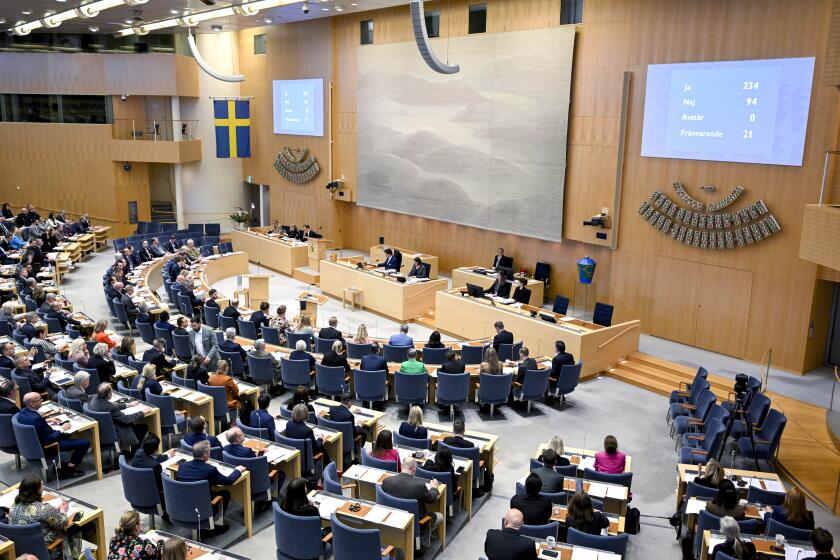Connecticut court allows gays to wed
The Connecticut Supreme Court on Friday gave gay and lesbian couples the right to marry, ruling that civil unions relegate them to a “separate” and “inferior status” that falls short of full equality.
“We therefore agree with the plaintiffs that ‘maintaining a second-class citizen status for same-sex couples by excluding them from the institution of civil marriage’ ” violates the state’s constitutional guarantee of equal protection of the laws, the state high court said.
By a 4-3 vote, the state justices agreed with eight same-sex couples who sued after they were denied marriage licenses four years ago.
Connecticut now joins Massachusetts and California in authorizing marriage for gay and lesbian couples. In all three cases, the issue was decided in a 4-3 ruling by the state high court.
Other state high courts, although divided, have narrowly rejected same-sex marriage in the last two years, including those in New York, Washington and Maryland. In 27 states, judges cannot take up the matter because the states’ constitutions describe marriage as a union of a man and a woman.
No state has authorized same-sex marriage through its legislation or by a popular vote.
On Nov. 4, California’s voters will consider Proposition 8, which seeks to render moot the state court’s May ruling that allowed such marriages. With a battle over the issue underway, the Connecticut ruling was greeted with both jubilation and outrage.
“This ruling is just more fuel for the fire in California,” said Sonja Eddings Brown, a spokeswoman for the Protect Marriage Coalition. Her organization is backing Proposition 8, which would amend the California Constitution to recognize only a marriage between a man and a woman as valid.
“We are at a cultural crossroads,” Brown said. “The election in California just takes on more importance.”
On the other side, the Rev. Susan Russell, a minister at the liberal All Saints Episcopal Church in Pasadena and a lesbian, said the Connecticut court’s decision “should be a source of celebration for all Americans. It’s a decision in favor of marriage and against bigotry.”
Kate Kendall, executive director of the National Center for Lesbian Rights in San Francisco, praised the ruling as a sign of a growing trend. “We are very gratified that today another state stood up for fundamental equality and the right of same-sex couples to marry,” she said. “Clearly, policymakers, elected officials and courts are recognizing the importance of the Constitution treating everyone equally.”
In 2005, Connecticut’s lawmakers authorized civil unions for same-sex couples, promoting the move as the first by a legislature not working under a court mandate. (Earlier, California lawmakers had authorized “domestic partnerships” for gay or lesbian couples.)
In Friday’s opinion, the state justices compared those civil unions to the discredited “separate but equal” doctrine used to justify racial segregation in the South before the U.S. Supreme Court’s decision in Brown vs. Board of Education in 1954.
While calling the Legislature’s effort “truly laudable,” Justice Richard Palmer, writing for the majority, said that the court “cannot discount the plaintiffs’ assertion that the Legislature . . . has relegated [same-sex couples] to an inferior status, in essence, declaring them to be unworthy of the institution of marriage.”
The three dissenters said this contentious issue should be decided by elected lawmakers, not judges.
“The ancient definition of marriage as the union of one man and one woman has its basis in biology, not bigotry,” wrote Justice Peter Zarella in his dissent. “If the state no longer has an interest in the regulation of procreation, then this is a decision for the legislature or the people of the state and not this court.”
Gov. M. Jodi Rell, a Republican, said she disagreed with the court’s ruling but would abide by it. “I do not believe their voice reflects the majority of the people of Connecticut,” she said. “However, I am also firmly convinced that attempts to reverse this decision -- either legislatively or by amending the state constitution -- will not meet with success.”
--
david.savage@latimes.com
Times staff writer Jessica Garrison in Los Angeles contributed to this report.
More to Read
Start your day right
Sign up for Essential California for news, features and recommendations from the L.A. Times and beyond in your inbox six days a week.
You may occasionally receive promotional content from the Los Angeles Times.







